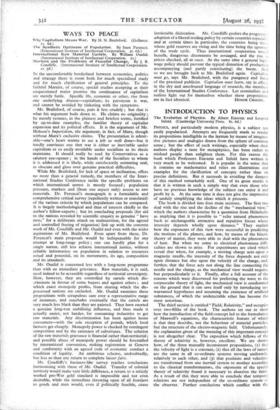WAYS TO PEACE
Why Capitalism Means War. By H. N. Brailsford. (Gollancz. is. 6d.) The Synthetic Optimum of Population. By Imre . Ferenczi. (International Institute of Intellectual Cooperation. 3s. 6d.) International Raw Material Cartels. By William Oualid. (International Institute of Intellectual Cooperation. zs.)
Markets and the Problems of Peaceful Change. By J. B. Condliffe. (International Institute of Intellectual Cooperation. 2S. 3d.)
IN the uncomfortable borderland between economics, politics and strategy there is room both for much specialised study and for much clarification of general principles. To the faithful Marxist, of course, special studies accepting as their unquestioned major premise the continuance of capitalism are merely futile. Specific ills, economic or other, rise from one underlying disease—capitalism; its paroxysm is war, and cannot be avoided by tinkering with the symptoms.
Mr. Brailsford, of course, puts it less crudely ; but that is what his argument boils down to. He claims no originality ; he merely restates, in the plainest and briefest terms, fortified by up-to-date examples, the familiar theory of capitalist expansion and its political effects. It is the argument of Mr. Hobson's Imperialism, the argument, in fact, of Marx, though without Marx's exclusive claims. The presentation is admir- able—one's heart warms to see a job so well done—but it hardly convinces one that war is either so inevitable under capitalism or so easily avoidable under socialism as its thesis maintains. It should really be read by Conservatives as a salutary eye-opener ; in the hands of the Socialists to whom it is addressed it is likely, while satisfactorily animating zeal, to obscure and gloss over genuine practical difficulties.
While Mr. Brailsford, for lack of space or inclination, offers no more than a general remedy, the members of the Inter- national Studies Conference tackle the specific problems on which international unrest is mostly focused ; population pressure, markets and (from one aspect only) access to raw materials. Dr. Ferenczi's monograph is a formidable and comprehensive critical survey (repellently written or translated) of the various criteria by which populations can be compared. It is largely methodological and thus of interest chiefly to the author's fellow-experts ; but its concluding proposals (for aid to the nations revealed by scientific enquiry as genuine " have nots," for a deliberate attack on malnutrition, for the agreed and controlled freeing of migration) link up with the concrete work of Mr. Condliffe and Mr. Oualid and even with the wider aspirations of Mr. Brailsford. Even apart from these, Dr. Ferenczi's main proposals would be indispensable for any attempt at long-range policy ; one can hardly plan for a single nation, still leis achieve international justice, without reliable information on population in relation to resources actual and potential, on its movements, its age, composition and its standards.
Mr. Oualid is concerned less with a long-term programme than with an immediate grievance. Raw materials, it is said, used indeed to be accessible regardless of territorial sovereignty. Now, however, they are controlled by cartels which dis- criminate in favour of some buyers and against others ; and which exact monopoly profits, from sharing which the dis- possessed nations are excluded. Mr. Oualid examines these propositions with scrupulous care over a representative range of instances, and concludes eventually that the cartels are very much less black than they are painted. They have exerted a genuine long-run stabilising influence, and thus made it actually easier, not harder, for consuming industries to get raw materials. Any discrimination has been against home consumers—with the sole exception of potash, which local farmers get cheaply. Monopoly power is checked by contingent competition and by the existence of substitutes. The solution of the raw materials grievance is financial rather than territorial; and possible abuse of monopoly power should be forestalled by international convention, making registration at Geneva and conformity with an agreed code of economic conduct a condition of legality. An ambitious scheme, undoubtedly, but less so than any return to complete laisser faire.
Mr. Condliffe's business-like survey reaches conclusions harmonising with those of Mr. Oualid. Transfer of colonial territory would make very little difference, a return to a strictly worked pre-War gold standard is impossible and not even desirable, while the immediate throwing open of all frontiers to goods and men would, even if iolitically feasible, cause
intolerable dislocation. Mr. Condliffe prefers the progressi., adoption of a liberal trading policy by certain countries especial' and at certain times in particular, the countries being the whose gold reserves are rising and the time being the upswin:,, of the trade cycle. Thus international cooperation wou!.I benefit, dangerous -discontents be assuaged, and the rise in prices checked, all at once. At the same time a general high- wage policy should prevent the typical distortion of production accompanying (and partly constituting) the boom. And so we are brought back to Mr. Brailsford again. Capitalism must go, says Mr. Brailsford, with the pungency and force of the practised publicist. Capitalism must learn, say in effect, in the dry and uncoloured language of research, the members of the International Studies Conference. Let nominalists and realists fight out for themselves whether these propositions


































 Previous page
Previous page